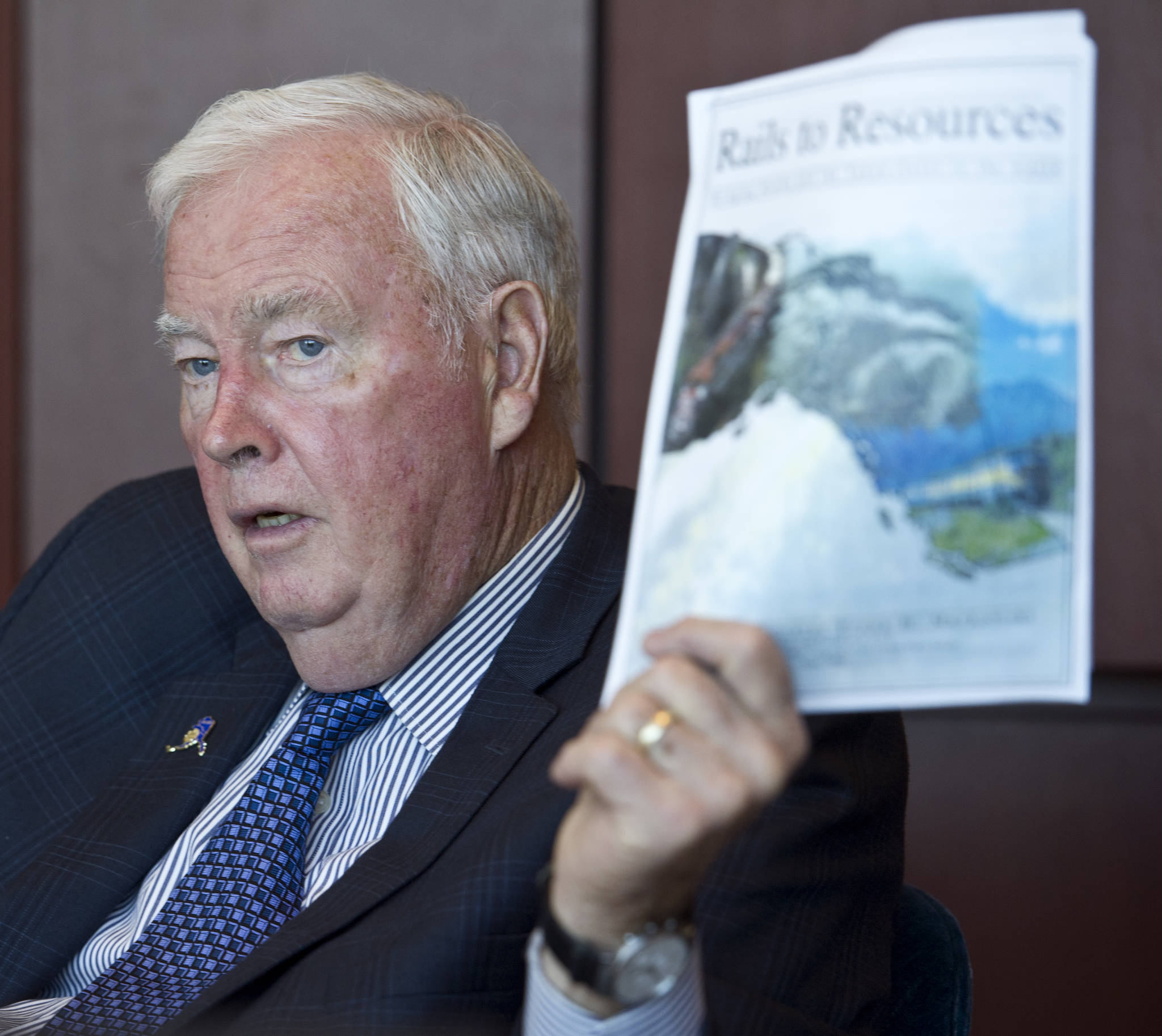Frank Murkowski has never lost his railroad dream. Now, he has another chance to make it reality.
In March, the former governor and U.S. Senator signed an agreement with Gov. Bill Walker to serve as a “special envoy” charged with finding a way to build a rail link between Alaska and the Canadian rail system.
Murkowski said he doesn’t have a timeline for finishing his investigation.
Murkowski will be unpaid in this job, and he doesn’t get state benefits, but the state will reimburse him for pre-approved travel and expenses.
On Tuesday, Murkowski spoke to the Empire, accompanied by his son Brian and former chief of staff Jim Clark.
As Brian unrolled a map of the Arctic, Murkowski explained the challenge.
The easternmost end of the Alaska Railroad is 38 miles short of Delta Junction, which itself is 220 miles from the Canadian border. That border is another 800 miles distant from Fort Nelson, the northern end of BC Rail.
“If the economics aren’t favorable, you’ve got a fairly significant problem,” he said.
With the state facing a multibillion-dollar annual deficit and the Alaska Railroad operating at a loss, any rail extension has to pay for itself. The state (or Alaska Railroad) could borrow the money for construction, but the new line would have to pay that money back.
“This thing isn’t going to happen unless there’s a way to amortize the cost,” Murkowski said. “If there is, there’s the possibility that capital will come in.”
To do that, Murkowski needs to find enough shippers willing to pay fees for using the railroad. That means finding mines, cargo companies and oil companies that would use the line.
“I’m not interested in running a railroad, I’m not interested in a route. I’m interested in – can we identify the economic viability?” Murkowski said.
That’s not an easy task: It’s one that has bedeviled every Alaska-Canada railroad proposal, and it’s one that Murkowski has failed to solve before.
The records of the 1899 Harriman Expedition include discussion of a railroad to Alaska, and the U.S. Army Corps of Engineers studied the idea during World War II, surveying a route from Prince George to Port Clarence at the western end of the Seward Peninsula.
A railroad was examined during the trans-Alaska Pipeline System boom, then again in the 1980s when the state was flush with money.
As a U.S. Senator, Murkowski encouraged the idea of an Alaska-Canada railroad, guiding a Rails to Resources Act through Congress. Signed by President Clinton, that act would have formed a commission to develop the idea, but Canada balked.
After Murkowski became governor, Alaska joined with the government of the Yukon to study the concept. The study, completed in 2006, found that linking Alaska to the Canadian rail system would cost about $11 billion but would generate $170 billion in economic development.
Last year, an Alberta-funded study indicated Alaska could be a railroad route for tar sands mined from that Canadian province, but linking Alberta to Alaska would cost between $28 billion and $34 billion (2016 Canadian dollars).
The state’s current rail plan, in draft form, quotes a 2007 feasibility study that determined a Canadian rail link “was not economically feasible and would not create enough revenue to support the project’s cost.”
Speaking to the Empire, Murkowski said he feels the project is worth a second look. New technology could change the costs and economics, and in 2007, the Alberta tar sands weren’t as developed as they are today.
“Maybe now, with technology and a couple of other factors, you could find enough tonnage,” he said.
Contact reporter James Brooks at james.k.brooks@juneauempire.com or call 419-7732.

